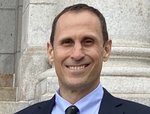


One of my favorite movies is “Groundhog Day.” In the 1993 film, Bill Murray plays a cynical television weatherman from Pittsburgh who goes to Punxsutawney, Penn., to cover the annual Groundhog Day festivities. He predicts a short winter, but after the groundhog sees his shadow, Murray gets more than another six more weeks of cold temperatures. He ends up reliving the same day, over and over again, in a never-ending time loop.
At first, Murray enjoys the benefits of being stuck in time. He can do anything he wants with no consequences. He eats like a pig, uses women, steals money, and indulges in his basest instincts. After a while, he gets depressed with this meaningless existence and becomes desperate to escape his circumstances. So he commits suicide in different ways. But there is no escape. Every day, he wakes up, on the same day, in the same bed, alone, with Sonny and Cher’s “I Got You Babe” playing on the alarm clock radio.
The only way he can stop the day from repeating is by doing something he never does – being unselfish. Once he stops thinking about himself and starts thinking about everyone else, he transforms himself into a good person. When he finally gets everything right, the cycle of trauma ends. The calendar turns to a new day.
These days, the world feels like we are living Groundhog Day. Wars are happening around the globe. Tensions are rising. People are struggling. With a global recession on the horizon, about 8 percent of the population, almost 650 million people, live in extreme poverty (surviving on less than $2.15 a day). Nature continues to wreak havoc, and natural disasters can be deadly.
Closer to home in Minneapolis, it’s a similar story on a smaller scale. We have an epidemic of car thefts (700 in January), car jackings remain a problem, and violence is a regular occurrence with shootings. Some lead to death.
On top of that, this winter has brought a lot more snow than usual and not enough plows or shovels to clear it (or even room for plows to do their job), leaving a trail of icy sidewalks and unplowed streets and alleys across the city. Throw in potholes the size of swimming pools, and it’s a recipe for chaos.
That chaos can create a cycle of trauma. Even if we don’t recognize the chaos as trauma, all these issues can take a physical, emotional and spiritual toll on our health and well-being. Some problems may seem minor, but the heaviness adds up. And with the major problems of society stuck on repeat, day after day, life can feel pretty demoralizing.
So, how do we come up with solutions? How do we make things right?
By giving. Time. Money. Knowledge. Skills. Work. Giving whatever we can.
Phil Connors, Bill Murray’s character in “Groundhog Day,” escaped his time loop when he stopped seeing the cycle as a curse and started seeing it as a blessing. When he saw his predicament as an opportunity to do good, he made things right.
We can do the same thing to break our cycles. We have the chance to do good.
The best part is anyone can give. That means anyone can be part of solutions.
As Martin Luther King Jr. said: “Everybody can be great. Because anybody can serve. You don’t have to have a college degree to serve. You don’t have to make your subject and your verb agree to serve. ...You only need a heart full of grace. A soul generated by love.”
We are putting together a community solutions team in Minneapolis with the Lowry Hill East Neighborhood Association. The solutions team brings together community and city leaders and builds on work we are doing with the Minnesota Peacebuilding Leadership Institute.
This work is all about community building that puts kids first and focuses on practical solutions. The concept draws inspiration from a community organization in St. Louis Park called Children First. Their philosophy is about changing the behavior of adults and having everyone in the community use the positive lens of 40 Developmental Assets to help raise our youth. The assets, created in 1997 by a youth development organization called Search Institute, range from family support to positive view of personal future.
The assets outline the relationships, experiences and expectations young people need to thrive. The community helps build these positive traits in the young people they know to put them on a path to a healthy, flourishing life. They have been proven to work.
In the next few weeks, we will be developing an actionable plan with actionable steps to create healthy communities in Minneapolis that put children first. By putting children first, the whole community can thrive.
You just have to be willing to give.
If you are interested in learning more about the community solutions program or being involved, please let us know.
Comments
No comments on this item Please log in to comment by clicking here